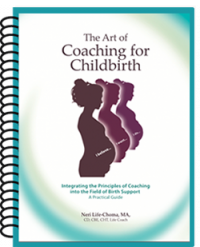
Can Prenatal Coaching Prevent Birth Trauma?
Preventing birth trauma is a much-desired goal, no less than preventing maternal death and reducing cesarean rates. As we have known for many years, birth trauma doesn’t necessarily tie to the unfolding of childbirth but instead relates to how birth givers were treated and how they feel they performed during their birth. Prenatal coaching can increase individuals’ performance levels and empower them to expect patient-centered and respectful care, reducing exposure to birth trauma.
What is Birth Trauma?
Between 25 and 34 percent of birth givers report having a traumatic birth experience, meaning they believed their lives, or their babies’ lives, were in danger or they experienced a serious threat to their physical or emotional integrity. (www.pattch.org). The stress caused by a traumatic pregnancy and childbirth experience often overrides the ability to cope emotionally, leading to psychiatric complications such as post-traumatic stress disorder (PTSD), postpartum depression (PPD), and postpartum anxiety (PPA).
As a seasoned birth support professional, I know that the fear of death in childbirth is genetically inherited. We call it genetic memory. Carl Jung, a Swiss psychiatrist, called it a “collective unconscious”– a broader concept of inherited traits, intuitions, and collective wisdom of the past. And since childbirth used to be a dangerous and threatening experience, an existential crisis for the whole community, this fear might be lingering in our minds while preparing for birth and throughout the experience. In our times, childbirth is not an existential threat. Modern developments such as blood transfusion, antibiotics, sanitation, plumbing, family planning, and better nutrition reduced the risks involved with childbirth. In addition, diagnostic tools have allowed us to reduce the fear around babies’ health during pregnancy and childbirth. We can detect and correct malpositions and, if needed, resolve them with a cesarean and avoid maternal or fetal death. Obstetric gynecology aims to eliminate the existential threat associated with childbirth, yet we are witnessing increased rates of birth trauma. Where is the catch, and what are the reasons for this increase?
The prenatal cycle of exam-fear-reassurance creates a habit of relying on medical figures and establishes their authoritative position
Birth Trauma and Prenatal Testing
Prenatal conversations I’ve had with my clients over the years helped me see that accessive medical and diagnostic tests throughout pregnancy are a double edge sword: they provide expectant people the comforts of prediction, a sense of control, and reassurance. But unfortunately, they also instill fear and establish the authority of medical experts. So, suppose a birth trauma is triggered by the belief that persons’ or their babies’ lives might be at risk or by a threat to their lives. In that case, we can understand why expectant persons are prone to develop anxiety and danger for their physiological integrity throughout their pregnancy and birth.
As for the other aspect of birth trauma – experiencing a threat to one’s emotional integrity: The prenatal cycle of exam-fear-reassurance creates the habit of needing external reassurance from medical figures and establishes their authoritative position. This habitual behavior is a power blocker, preventing birthing persons from standing in their power and expecting to be considered experts who are in charge of their experiences and whose values and desired experiences must be included in the decision-making process during childbirth.
How Can Prenatal Coaching Help?
Coaching in any field helps remove power blockers and limiting beliefs that may hinder individuals from achieving their desired experiences. Whether in their career, relationships, or executive aspirations, people seek coaches to help them overcome internal resistances and power blockers and achieve their goals. Trained prenatal coaches do the same: we work with coaching exercises and models to help our clients explore their relationships with authoritative figures and, more specifically, their beliefs around the balance of power between what they know and what the medical experts know. We help them clarify the spectrum of situations in which their internal authority counts more than the medical one and the moments in which it would be wise to allow the medical teams to do what they’ve been trained to do: save lives.
Prenatal Coaches establish client-centered partnership and train expectant individuals to expect patient-centered and respectful care
Coaching Relationships and the Prevention of a Birth Trauma
The integration of coaching exercises is only partially responsible for the paradigm shift that coaches lead. The unique relationships coaches develop with their clients are a client-centered partnership that trains expectant individuals to expect patient-centered care from their caregivers. We model active listening and non-judgemental interaction and consider our clients’ desired experiences our north; we partner with them to help them achieve their visions.
Combining the coaching inquiry about whose knowledge counts and when with the empowering process we hold for months before their childbirth, my students and I see a significant reduction in birth trauma and in our chances of being exposed to second-hand trauma as witnesses when our clients’ emotional or physical integrity is being damaged.
Are you interested to learn more about the Transformational Childbearing Coaching approach and how you can learn it? Visit the link below:
>>>https://birthcoachmethod.com/membership-program/
- Overshadowing the Transformative Essence of Childbirth with Data - July 10, 2024
- Navigating the Epidural Dilemma - May 28, 2024
- Informed Decision in Birth Support: A Myth of Empowerment? - April 29, 2024
medical interventions in childbirth, prenatal, prenatal coach


